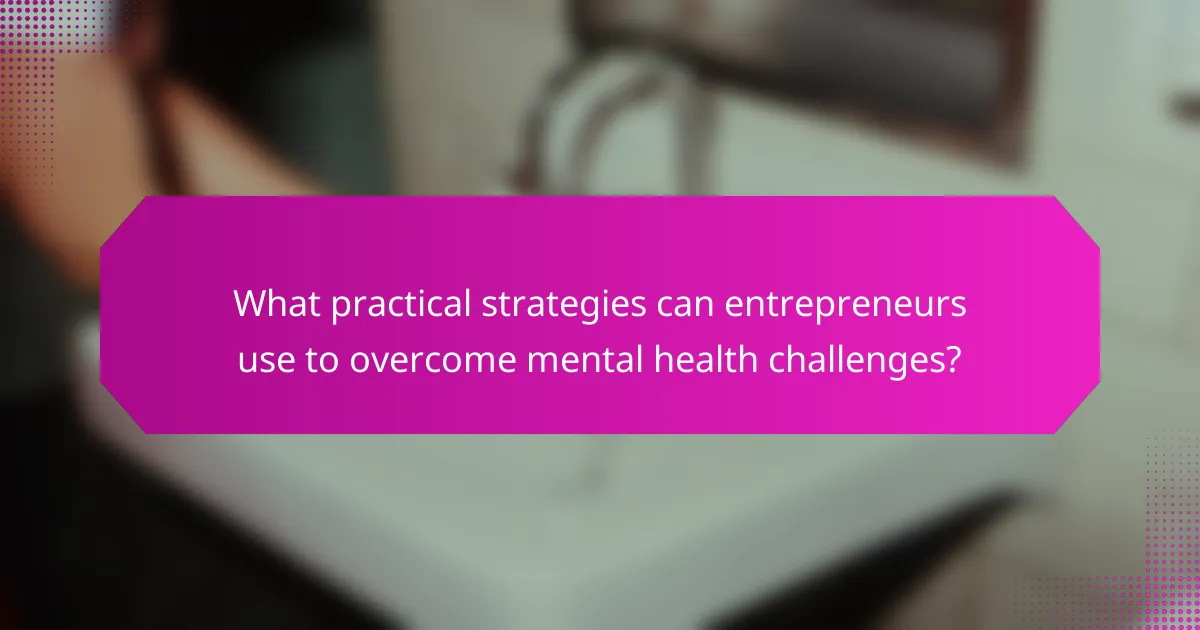Entrepreneurs often struggle with mental health challenges, including stress, anxiety, and burnout. These issues arise from financial pressures, long working hours, and isolation. Effective strategies involve prioritising self-care, establishing work-life boundaries, and seeking support. Implementing these practices can enhance resilience and promote overall well-being in business ownership.

What are the common mental health challenges faced by entrepreneurs?
Entrepreneurs commonly face mental health challenges such as stress, anxiety, and burnout. These issues stem from high demands, uncertainty, and isolation in business ownership.
Stress often arises from juggling multiple responsibilities and decision-making pressures. Anxiety can develop due to fear of failure and financial instability. Burnout frequently results from prolonged periods of overwork without adequate rest or support.
Addressing these challenges requires proactive strategies. Entrepreneurs can benefit from establishing work-life balance, seeking support networks, and practising mindfulness techniques. Prioritising mental well-being enhances overall productivity and business success.
How does stress manifest in business ownership?
Stress in business ownership often manifests as anxiety, burnout, and overwhelming pressure. Entrepreneurs face unique mental health challenges due to high stakes and constant demands. Common symptoms include fatigue, irritability, and difficulty concentrating. Research indicates that nearly 50% of entrepreneurs experience mental health issues, underscoring the need for effective coping strategies. Recognising stressors and implementing self-care practices can mitigate these challenges and promote resilience.
What role does anxiety play in entrepreneurial success?
Anxiety can significantly impact entrepreneurial success by influencing decision-making and overall well-being. Entrepreneurs often face high levels of stress, which can lead to anxiety and burnout. Recognising and managing anxiety is crucial for maintaining productivity and fostering resilience. Effective coping strategies, such as mindfulness and time management, can mitigate anxiety’s negative effects. Research indicates that entrepreneurs who proactively address their mental health challenges are more likely to achieve long-term success.
How can burnout impact business performance?
Burnout significantly reduces business performance by impairing decision-making, lowering productivity, and increasing absenteeism. Entrepreneurs facing burnout often struggle to maintain focus, leading to missed opportunities and decreased innovation. The emotional toll can result in high turnover rates among employees, further destabilising the business. Addressing burnout is essential for sustaining long-term growth and success.

What universal factors contribute to mental health issues in entrepreneurs?
Entrepreneurs face mental health challenges due to high stress, anxiety, and burnout. Key universal factors include financial pressure, long working hours, isolation, and the constant demand for innovation. Financial instability can lead to chronic stress, impacting emotional well-being. Long hours contribute to exhaustion, making it difficult to maintain a work-life balance. Isolation often results from the demanding nature of entrepreneurship, which can exacerbate feelings of anxiety. Additionally, the pressure to innovate can create a fear of failure, further intensifying mental health struggles. Addressing these factors is crucial for fostering resilience and promoting well-being in business ownership.
How do long working hours affect mental well-being?
Long working hours negatively impact mental well-being, leading to increased stress, anxiety, and burnout among entrepreneurs. Prolonged hours can disrupt work-life balance, reducing personal time and increasing feelings of isolation. According to a study, entrepreneurs working over 50 hours a week are 30% more likely to experience mental health issues. Effective strategies to combat these challenges include setting boundaries, prioritising self-care, and seeking support from peers. Addressing these mental health challenges is essential for sustainable business success and personal fulfilment.
What is the impact of financial pressure on mental health?
Financial pressure significantly impacts mental health, leading to increased stress, anxiety, and burnout among entrepreneurs. These challenges stem from constant demands, financial uncertainty, and the pressure to succeed. Studies indicate that 72% of entrepreneurs experience mental health issues, with financial strain as a key contributor. This stress can manifest physically and emotionally, affecting decision-making and overall well-being. Addressing financial pressure through effective management strategies is crucial for maintaining mental health in business ownership.
How does isolation influence entrepreneurs’ mental health?
Isolation negatively impacts entrepreneurs’ mental health by increasing stress, anxiety, and burnout. Entrepreneurs often face unique challenges, including a lack of social support and the pressure of decision-making. As a result, feelings of loneliness can exacerbate mental health issues. Research indicates that over 70% of entrepreneurs experience mental health challenges, highlighting the need for effective coping strategies. Engaging in networking and seeking mentorship can mitigate these effects, fostering a sense of community and shared experience.

What unique mental health challenges do entrepreneurs face compared to other professions?
Entrepreneurs face unique mental health challenges such as heightened stress, anxiety, and burnout due to the pressures of business ownership. These individuals often experience an overwhelming sense of responsibility, leading to chronic stress. A study found that 72% of entrepreneurs report mental health issues, significantly higher than the general population. Additionally, the isolation of entrepreneurship can exacerbate feelings of anxiety and depression. Unlike other professions, entrepreneurs frequently struggle with work-life balance, as the demands of their business can encroach on personal time, increasing the risk of burnout.
How does the fear of failure affect entrepreneurs?
The fear of failure can significantly hinder entrepreneurs by increasing stress, anxiety, and burnout. This fear often leads to decision paralysis, preventing effective action and innovation. Entrepreneurs may experience heightened self-doubt, impacting their mental resilience and overall business performance. Studies show that managing this fear through supportive networks and coping strategies can enhance mental health and productivity.
What is the relationship between passion and mental health in business ownership?
Passion significantly influences mental health in business ownership by providing motivation and purpose. Entrepreneurs often face stress, anxiety, and burnout, yet passion can serve as a buffer against these challenges. Engaging in work that aligns with personal values enhances resilience, promoting a positive mindset. Studies show that passion-driven entrepreneurs report higher satisfaction and lower levels of stress compared to those lacking passion. Cultivating passion through meaningful work can lead to improved mental health and overall well-being in business ownership.

What rare mental health issues are associated with entrepreneurship?
Rare mental health issues associated with entrepreneurship include obsessive-compulsive disorder, bipolar disorder, and attention deficit hyperactivity disorder. Entrepreneurs often face unique stressors that can exacerbate these conditions. Research indicates that 72% of entrepreneurs experience mental health challenges, highlighting the need for effective coping strategies. Addressing these rare issues is crucial for sustainable business success.
How can imposter syndrome affect business owners?
Imposter syndrome can significantly hinder business owners by fostering self-doubt and anxiety. This mental health challenge can lead to decision paralysis, affecting productivity and innovation. Entrepreneurs may struggle to recognise their accomplishments, which can result in burnout and stress. Research indicates that approximately 70% of individuals experience imposter syndrome at some point, with higher prevalence among entrepreneurs. This unique attribute underscores the need for effective coping strategies to mitigate its impact on business performance.
What are the signs of entrepreneurial depression?
Entrepreneurial depression often manifests through signs such as persistent sadness, fatigue, and feelings of isolation. Entrepreneurs may experience increased anxiety, difficulty concentrating, and a lack of motivation. These symptoms can lead to burnout, significantly affecting business performance and personal well-being. Recognising these signs early is crucial for seeking support and implementing effective coping strategies.

What practical strategies can entrepreneurs use to overcome mental health challenges?
Entrepreneurs can adopt several practical strategies to manage mental health challenges effectively. Prioritising self-care, establishing a supportive network, and practising mindfulness can significantly reduce stress and anxiety.
Setting clear boundaries between work and personal life helps prevent burnout. Regular physical activity and maintaining a balanced diet contribute to overall well-being. Seeking professional help, such as therapy or counselling, can provide additional support.
Implementing time management techniques allows entrepreneurs to allocate time for relaxation and hobbies. These strategies foster resilience and enhance productivity, ultimately leading to healthier business ownership.
How can entrepreneurs implement stress management techniques?
Entrepreneurs can implement stress management techniques by incorporating mindfulness practices, time management strategies, and physical exercise into their routines. Mindfulness techniques, such as meditation and deep breathing, can enhance focus and reduce anxiety. Effective time management allows entrepreneurs to prioritise tasks, minimising overwhelm. Regular physical exercise not only boosts mood but also improves resilience against stress. Each of these strategies addresses unique aspects of mental health challenges faced by entrepreneurs, contributing to overall well-being.
What are effective time management strategies?
Effective time management strategies for entrepreneurs include prioritising tasks, setting clear goals, and delegating responsibilities. Implementing tools like calendars and productivity apps can enhance focus and organisation. Establishing boundaries between work and personal life is crucial for maintaining mental health. Regular breaks and mindfulness practices can prevent burnout and reduce anxiety.
How can physical exercise improve mental health?
Physical exercise significantly enhances mental health by reducing stress, anxiety, and burnout among entrepreneurs. Regular physical activity releases endorphins, which improve mood and promote relaxation.
Studies show that exercise can lower cortisol levels, the hormone associated with stress. Engaging in physical activities, such as running or yoga, fosters resilience and helps entrepreneurs manage the pressures of business ownership.
Furthermore, exercise encourages social interaction, which can combat feelings of isolation that many entrepreneurs experience. Incorporating physical activity into daily routines is a practical strategy for improving mental well-being.
For optimal benefits, aim for at least 150 minutes of moderate-intensity exercise weekly. This commitment not only enhances mental health but also boosts productivity and creativity in business endeavours.
What role does seeking professional help play in mental wellness?
Seeking professional help is crucial for entrepreneurs facing mental health challenges. It provides essential support in managing stress, anxiety, and burnout effectively. Professional guidance helps identify coping strategies tailored to individual needs. Additionally, therapy can lead to improved decision-making and enhanced resilience in business ownership. Engaging with mental health professionals fosters a proactive approach, reducing the stigma around seeking help and promoting overall wellness.

What are the best practices for maintaining mental health as an entrepreneur?
To maintain mental health as an entrepreneur, prioritise self-care, establish boundaries, and seek support. Regular exercise, mindfulness practices, and time management can help mitigate stress and anxiety.
Develop a routine that includes breaks to prevent burnout. Engage in networking with fellow entrepreneurs for shared experiences and advice. Consider professional help if feelings of overwhelm persist.
Implementing these strategies can enhance resilience and overall well-being, leading to more sustainable business ownership.
How can building a support network benefit entrepreneurs?
Building a support network significantly benefits entrepreneurs by reducing stress, anxiety, and burnout. A strong network provides emotional support, practical advice, and resources that enhance resilience.
Entrepreneurs often face unique mental health challenges, making community connections essential. Engaging with peers fosters a sense of belonging and shared experience, which can alleviate feelings of isolation.
Moreover, support networks can offer accountability, encouraging entrepreneurs to maintain healthy work-life boundaries. This aspect is crucial in preventing burnout, as it promotes self-care practices and stress management techniques.
Ultimately, building a support network equips entrepreneurs with diverse perspectives and problem-solving strategies, enhancing their overall mental well-being and business success.
What are common mistakes to avoid in managing mental health?
Common mistakes in managing mental health include neglecting self-care, failing to set boundaries, and ignoring signs of stress. Entrepreneurs often prioritise business over personal well-being, leading to increased anxiety and burnout. Recognising the importance of mental health is essential to sustaining productivity and creativity. Regular breaks and seeking support can mitigate stress and enhance resilience.
What expert insights can guide entrepreneurs in prioritising mental well-being?
Entrepreneurs can prioritise mental well-being by implementing structured strategies that address stress, anxiety, and burnout. Regular self-assessment of mental health, establishing boundaries, and seeking professional support are crucial.
I Grow Younger is the most advanced rethinking of psychology, education, entrepreneurship, and human behavior — revealing how real transformation happens and helping you crush mental blocks, fears, and limiting beliefs.
1. Schedule regular breaks to recharge and prevent burnout.
2. Practice mindfulness techniques to manage anxiety.
3. Set realistic goals to reduce overwhelming stress.
4. Build a support network for sharing experiences and coping strategies.
These insights encourage a proactive approach to mental health, enabling entrepreneurs to thrive in their business endeavours.


